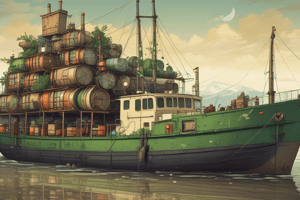Podcast
Questions and Answers
What is upcycling?
What is upcycling?
- The process of transforming waste materials into new products of higher quality. (correct)
- The process of transforming waste materials into new products of lower quality.
- The process of transforming waste materials into new products of different quality.
- The process of transforming waste materials into new products of the same quality.
What is downcycling?
What is downcycling?
- The process of transforming waste materials into new products of the same quality.
- The process of transforming waste materials into new products of different quality.
- The process of transforming waste materials into new products of higher quality.
- The process of transforming waste materials into new products of lower quality. (correct)
When were the terms upcycling and downcycling first used in print?
When were the terms upcycling and downcycling first used in print?
- 1994 (correct)
- 1996
- 1990
- 1992
What is the goal of upcycling?
What is the goal of upcycling?
How has upcycling shown significant growth across the world?
How has upcycling shown significant growth across the world?
In which industries can upcycling be applied?
In which industries can upcycling be applied?
What is one way upcycling has been used in the fashion industry?
What is one way upcycling has been used in the fashion industry?
How can food waste be upcycled?
How can food waste be upcycled?
What is one example of upcycling agricultural waste?
What is one example of upcycling agricultural waste?
Flashcards are hidden until you start studying
Study Notes
Upcycling is the process of transforming waste materials into new products of higher quality. This is the opposite of downcycling, which involves converting materials into lesser quality products. The terms upcycling and downcycling were first used in print in 1994. The goal of upcycling is to reduce the consumption of new raw materials when creating new products, resulting in a reduction of energy usage, air pollution, water pollution, and greenhouse gas emissions. Upcycling has shown significant growth across the world, with the number of products tagged with the term "upcycled" increasing from about 7,900 in January 2010 to 263,685 in April 2013. Upcycling has applications in art, music, industry, clothing, and food. In the fashion industry, upcycling has been used to create entire collections from textile waste, reducing the amount of waste going into landfills. Food waste can be upcycled by feeding it to animals, breaking it down into bio-fuel, or using it in compost to enrich soil. Designers and educators are attempting to raise awareness about upcycling and transform waste into marketable products. Potential technologies for upcycling include converting waste plastics into paramagnetic, conducting microspheres or carbon nano-materials, and biotransformation upcycling of plastic waste into biodegradable PHA bioplastic using bacteria.New Approaches to Upcycling Wastewater and Agricultural Waste
- Researchers are developing technologies to upcycle wastewater and agricultural waste into useful products.
- A team of scientists at Nanyang Technological University in Singapore has developed a new way to turn sewage sludge into biodegradable plastics, known as polyhydroxyalkanoates (PHA).
- The scientists used a special type of bacterium to break down organic matter in sewage sludge, converting it into PHA.
- Another approach involves using powdered orange peel in combination with carbon nanotubes as a composite material to remove synthetic dyes from wastewater.
- Biotechnology companies are shifting focus towards converting agricultural waste or biomass into different chemicals or commodities.
- BioTork, a biotechnology company, has signed an agreement with the State of Hawaii and the USDA to convert unmarketable papayas in Hawaii into fish feed.
- This initiative is part of the Zero Waste Initiative put forward by the State of Hawaii.
- BioTork will upcycle the otherwise wasted biomass into fish feed.
- A study published in the Journal of Environmental Management showed that it is possible to produce biogas from cassava wastewater, a byproduct of cassava processing.
- The study found that the wastewater could be used as a feedstock for biogas production, which could be used to generate electricity and heat.
- The use of cassava wastewater for biogas production could help reduce greenhouse gas emissions from cassava processing.
- The study also found that the process of biogas production could help reduce the amount of organic matter in the wastewater, making it easier to treat.
Studying That Suits You
Use AI to generate personalized quizzes and flashcards to suit your learning preferences.




